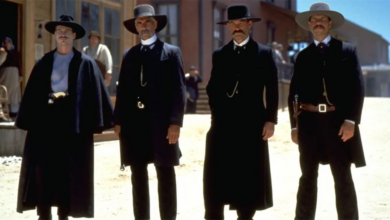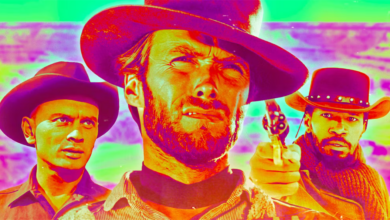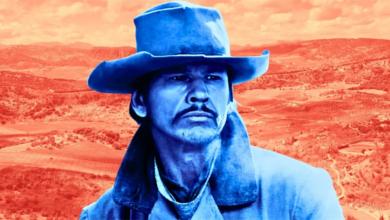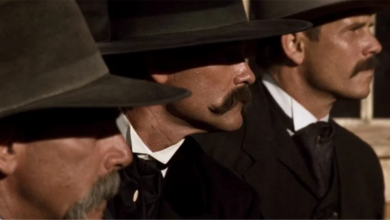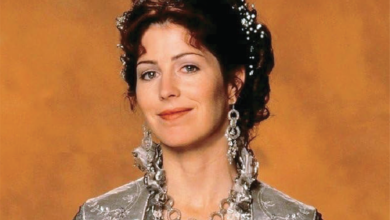16 Iconic Quotes from Classic Western Movies
These are the lines that sound best when muttered through clenched teeth.
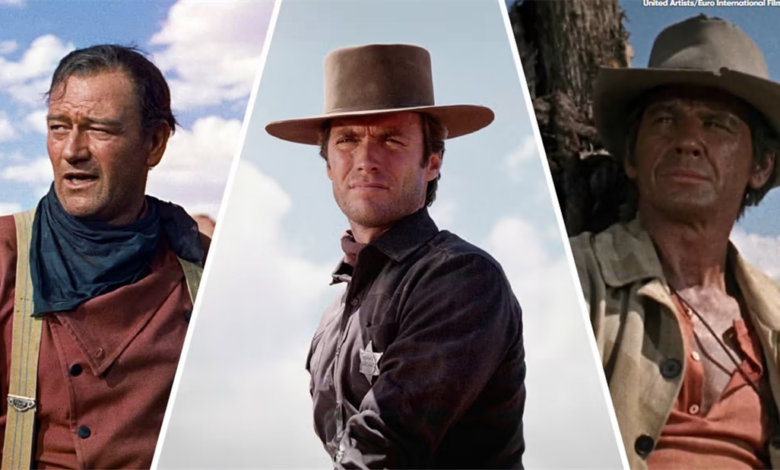
It’s not difficult to understand America’s obsession with the Old West. Like the superhero craze, it’s a genre filled with daring heroes and dastardly villains, spanning action shoot-em-ups to Oscar-bait prestige pieces. Alpha types John Wayne and Clint Eastwood won crowds by looking cool in a cowboy hat and carbine rifle. Those guys were at their best when they were down and out, because we love an underdog. Wayne’s lone Oscar is for 1969’s True Grit, as the flawed vigilante with a chip on his shoulder, Rooster Cogburn. And Clint? He never showed up at the end without bruises. The quotable material they bring to their Westerns is badass, but within, there is also nobility, laughter, and genuine wisdom. These are the most iconic quotes from classic Western movies.
16, “I don’t like it, no sir. I’ve always treated every man the same. Just as another future customer.” – The Undertaker in The Magnificent Seven

One of the sharpest scripts in the bunch, the original The Magnificent Seven, based on Akira Kurosawa’s Seven Samurai, racks up enough zingers to fill this entire list (and it’ll appear again later). Steve McQueen’s Vin alone has the kind of silly non sequiturs that make you scratch your head, though they require a lot of context. But this throwaway line during a debate on race, from character actor Whit Bissell as the town undertaker, is easy to miss.
It’s in the middle of some quick back-and-forth, but the line shows poise. Naturally, if his customers are already dead, who would care about race?
15, “When you hang a man, you better look at him.” – Marshal Cooper in Hang ‘Em High

The opening scene to Hang ‘Em High is a body blow: even before the title card, Clint Eastwood is hanged by a posse for a crime he didn’t commit. He’s left for dead, then cut down and saved at the last minute by a fellow lawman with a distaste for vigilante justice. He spends the rest of the movie keeping a promise to a judge not to kill the men responsible.
Then he tries to arrest Reno, a member of the hanging posse. Approaching him in a bar, he recites the icy line above while pulling down his neckerchief to reveal the distinctive scar left on his neck (eat your heart out, Lt. Aldo Raine). One look from Clint, and we all know the guy’s toast.
14, “I’m looking at a tin star with a drunk pinned on it.” – Cole in El Dorado

Sheriff J.P. Harrah, played by Robert Mitchum at his sloppiest, is a drunk. When his old friend Cole Thronton returns to El Dorado and finds J.P., heartbroken, at the bottom of a whiskey bottle, he takes action, emptying a bucket of water on the passed-out Sheriff. He startles awake: “What the hell are you doing here?” Cole stings him with the above remark in his weathered, John Wayne, dry-as-leather drawl.
Mitchum’s drunk sheriff smiles, then takes a swing, leaning like it’s the twelfth round. He gets a frying pan to the face for his trouble, and laid back out on his jailhouse cot.
13, “I guess you can’t break out of prison and into society in the same week.” – Ringo Kid in Stagecoach

John Wayne’s breakout, a featured role rather than a starring one, came in an early Western, John Ford’s 1939 film Stagecoach. Still in black and white, the Ringo Kid twirls his rifle while cocking a round (a move he would use throughout his career, copied brilliantly by Schwarzenegger in Terminator 2), blocking the path of the titular coach as the camera pushes in on his face. It’s an unforgettable entrance, and the foundation of a future star.
The Kid is on the path of the coach because he needs a lift after his horse turned up lame, and despite being an escaped felon, his rifle skills are valued during the crossing through dangerous Apache territory. That night at an outpost, the snootier members of the traveling party turn their noses up him during dinner, prompting this observation.
It’s sweet that the Duke identifies as working class, just don’t ask him about the Apache in the film, who were painted one-dimensionally as remorseless butchers. It’s interesting and fun, and the action work of the time is stunning; just remember the cultural open-mindedness of today isn’t what it was in the 30s.
12, “Dying ain’t much of a living, boy.” – Josey in The Outlaw Josey Wales

By 1976, Clint Eastwood had already spit every single one of the quotes on this list through his signature snarl (and one that’s not: “Do I feel lucky? Well, do ya, punk?”). By the time he played The Outlaw Josey Wales, his savage badassery had become a cottage industry. Here’s the proof, after a well-dressed stranger enters a saloon filled with laughter, witnesses, and a bearded Josey Wales on the run:
Stranger: “I’m looking for Josey Wales.”
Wales: “That’d be me.”
Stranger: “You’re wanted, Wales.”
Wales: “Reckon I’m right popular. You a bounty hunter?”
Stranger: “Man’s got to do something for a living these days.”
Wales: “Dying ain’t much of a living, boy.”
You get three guesses as to how that interaction ends, but you only need one.
11, “That’ll be the day.” – Ethan Edwards in The Searchers

In his most misanthropic role, some say his best, John Wayne plays Ethan Edwards, a former Confederate soldier who returns to his brother’s West Texas homestead. The Searchers refers to the search for his young niece, Debbie, who is abducted after the family is killed in a Comanche raid. For years, he repeats that line, and uses it to push away everyone and everything important to him.
When they finally find Debbie, Ethan has decided she is too culturally far gone in her time with the Comanche, and tries to kill her. When his nephew, one of the last of his family, tells Ethan, “I hope you die,” Ethan’s go-to response shows how little he cares, but it’s also a disheartening look at his own future, alone and full of spite. He’s searching for his soul, not his niece. In the end, his search continues.
10, “Were you gonna die alone?” – Blondie in The Good, the Bad, and the Ugly

Filmmaker Sergio Leone is an absolute master of tension. A shootout in a dusty, derelict Western town in anyone else’s hands is an action set piece. In The Good, the Bad, and the Ugly, it’s art.
Tuco’s alone, wishing he had somebody, anybody, to help him face down Angel Eyes’ gang. His only accompaniment is Ennio Morricone’s eerie timpani and woodblock. Suddenly, a noise. Tuco turns and draws, almost fires— but it’s his old friend, Blondie, leaning against a blown-out window frame and smiling his way through the line. The pair go on to slaughter the gang and run Angel Eyes out of town. To be continued…
9, “I’ve been offered a lot for my work. But never everything.” – Chris in The Magnificent Seven

Yul Brynner’s Chris is the wise sage of The Magnificent Seven; mild-mannered, even-tempered, and he always knows what to say. As skilled a gunfighter as they come, he’s been drifting, like most of the Seven, having difficulty finding work in a dying frontier. When three villagers from a remote Mexican town ride in seeking help against the ruthless bandit Calavera, Chris is the first to hear them out, offering “everything we own, everything of value in the village.” They lay out a handkerchief’s worth of shiny heirlooms in a small handkerchief for Chris to examine.
He immediately understands that the job will never be about money. However, in taking the job and risking their necks, he and his six cohorts subject themselves to a higher nobility, and come to understand the value of community. Also, a timeless musical score.
8, “Looks like we’re shy one horse.” – Harmonica in Once Upon a Time in the West

Once Upon a Time in the West is a masterclass of cinematic storytelling. Leone’s language is visual, and it’s the wordless sequences in the film that are its most powerful. Still, star Charles Bronson get a few lines in. During his intro, a train passes by Flagstone station, and Bronson appears from behind it. No one else at the desolate stop but the trio of marauders who have come to shoot him down. Noting the three horses tied up behind them, he asks if they brought a horse for him. They laugh.
There’s a shootout, and all four hit the ground. Harmonica is the only one who gets up.
7, “I call that bold talk from a one-eyed fat man!” “Fill your hands, you sonuvab**ch!” – Ned Pepper & Rooster Cogburn in True Grit

It’s the insult that begets the climactic shootout of the entire film, in which U.S. Marshall Rooster Cogburn confronts his nemesis, Ned Pepper, from across an open field, along with three members of his gang. Rooster threatens him, and gets this response.
It’s a gallant horseback charge that follows, with Rooster double-fisting his guns and holding his horse’s reins in his teeth. The original True Grit, from 1969, shows John Wayne and Robert Duvall at odds with each other in the exchange, although the Coen Brothers’ 2010 version is practically a word-for-word remake, and the above exchange is spoken verbatim, and with equal tension, by Jeff Bridges and Barry Pepper (no relation).
6, “We’ve got to start thinking beyond our guns. Those days are closing fast.” – Pike Bishop in The Wild Bunch

In The Wild Bunch, the West is dying. It’s 1913. Bank robbers have become robber barons, gunfighters have become soldiers, and even the fastest draw is no match for the Gatling Gun, the first automatic firearm. The aging cowboys of the film are well aware, and Pike Bishop, the salt-and-pepper haired leader of a gang, is looked to by his men for his brains and strategy.
Unfortunately, their latest raid, in which a posse murdered around half their numbers, they find the only loot therein are a bunch of steel washers, planted there by Harrigan, the railroad tycoon from whom they were stealing. The failure sends the gang south of the Mexican border to recollect themselves, thereby setting in motion the events of the film. Pike’s just telling the world that he knows he’ll die with gunpowder marks on his hands.
5, “My mistake. Four coffins.” – The Man with No Name in A Fistful of Dollars

In A Fistful of Dollars, Clint Eastwood’s Man with No Name breezes into town on a mule, and gets made fun of, and even playfully shot at, by three acolytes of the Baxter gang. After learning the dynamic of the town revolves around a blood feud between the Baxter family and the Rojo family, the Man with No Name decides to use his skills to profit off their power struggle. He waltzes back to the men who insulted him, stopping briefly next to the town woodworker to request three coffins.
He returns after a playful exchange that ended in him killing four guys. On his way back, he apologizes to the carpenter. And so launched the career of Clint Eastwood.
4, “You risk your skin catching killers and the juries turn them loose, so they can come back and shoot at you again. If you’re honest, you’re poor your whole life, and in the end, you end up dying all alone on some dirty street. For what? For nothing. For a tin star.” – Martin in High Noon

Perhaps the most overtly moral tale in the bunch, High Noon focuses on Will Kane, the middle-aged sheriff of a frontier town, and his new Quaker bride, Amy. All set to retire and run a store somewhere as a couple, he’s confronted on his last day by a call of duty: Frank Miller, a dreaded gang leader Kane had previously imprisoned, is returning on the noon train, the day before the new sheriff arrives. Everyone tells Kane to simply leave; even Amy, whose strict religious beliefs make her a pacifist, and Martin, the former sheriff and Kane’s mentor.
Martin’s candid truth comes with a rejection— with his arthritis, Martin couldn’t so much as pull a trigger, anyway. His brush-off piles on those of the townspeople, friends, and fellow law officers who’ve forsaken Kane’s pleas for help. Even though Kane knows Martin’s words are true, his sense of duty is the only support he has, and he intends to keep it to his last hour.
Reportedly President Bill Clinton’s favorite film, High Noon won four Oscars, including one for Gary Cooper as Kane, and was among the first 25 films chosen for preservation by the Library of Congress when establishing the U.S. Film Registry. Martin’s quote is one of the more meaningful arguments of moral relativism from the cinema of the time.
3, “Boy, I got vision, and the rest of the world wears bifocals.” – Butch in Butch Cassidy and the Sundance Kid

Butch Cassidy and the Sundance Kid is all about personality. Chemistry between leads Paul Newman and Robert Redford is what gives the film its pulse.
Newman’s Butch is the idea man, always on the lookout for a new score, able to talk and reason himself, and anyone else, into anything. Redford’s Sundance is the pro, a Colt on his hip, called upon when there’s heavy lifting to be done. Their dialogue is both fun and funny, making you wish you were a movie star just so you could hang out with people this cool.
Butch’s line is too smart for this world; he is immature at heart, never taking the time to assess, or change. He loves being the smartest guy in the Hole in the Wall gang, because there’s no competition.
2, “This is the West, sir. When the legend becomes fact? Print the legend.” – Maxwell Scott in The Man who Shot Liberty Valance

Most of the entries on this list are classics because of what the movie has to say. A theme, a particular artistry, or just some enjoyable action and quick barbs between stars. While The Man Who Shot Liberty Valance has all that, it also has the most fully flushed out characters of any Western before and after.
Ranse Stoddard and Tom Doniphan are human, first and foremost. They make errors, feel ashamed, lose their tempers, fail in their tasks, and experience loss. The myth meets the man when their lives intertwine; both are in love with Hallie, a young waitress in town, and neither cares for Liberty Valance, the bad element in town.
Doniphan essentially sacrifices himself for Ranse, who, decades later, becomes a national political figure. When a reporter, Maxwell Scott, hears the previously untold story, he knows better than to mess with it. The legend lives on when he tosses his notes into the fire and walks away.
1, “Blonde! You know what you are?! Just a dirty son of a—” – Tuco in The Good, the Bad, and the Ugly

There is no more famous Western than The Good, the Bad, and the Ugly. It’s what The Wrath of Khan was to Star Trek: a movie that even non-fans of the genre can enjoy. And there’s no line more famous than the last one in the film.
The music, the pressure built over the famous standoff scene, the sweat and strain and tension of Tuco left on his tiptoes, gutturally begging for his life, crying, with a noose around his neck, while Blondie turns into a dot on the horizon.
Then, the ultimate catharsis: Blondie turns, raises the sight on his rifle, and like he’s done a hundred times before, shoots the rope strangling his (sometimes) friend. He rides off, smug, with his take of Bill Carson’s Confederate gold fortune, and Tuco, the Ugly, hands still bound, yells after him, taking his time, letting his words echo off the surrounding hills while Ennio Morricone’s timeless score plays us out of the film. One of the best endings to a film of all time, and we never even heard Eli Wallach curse.

